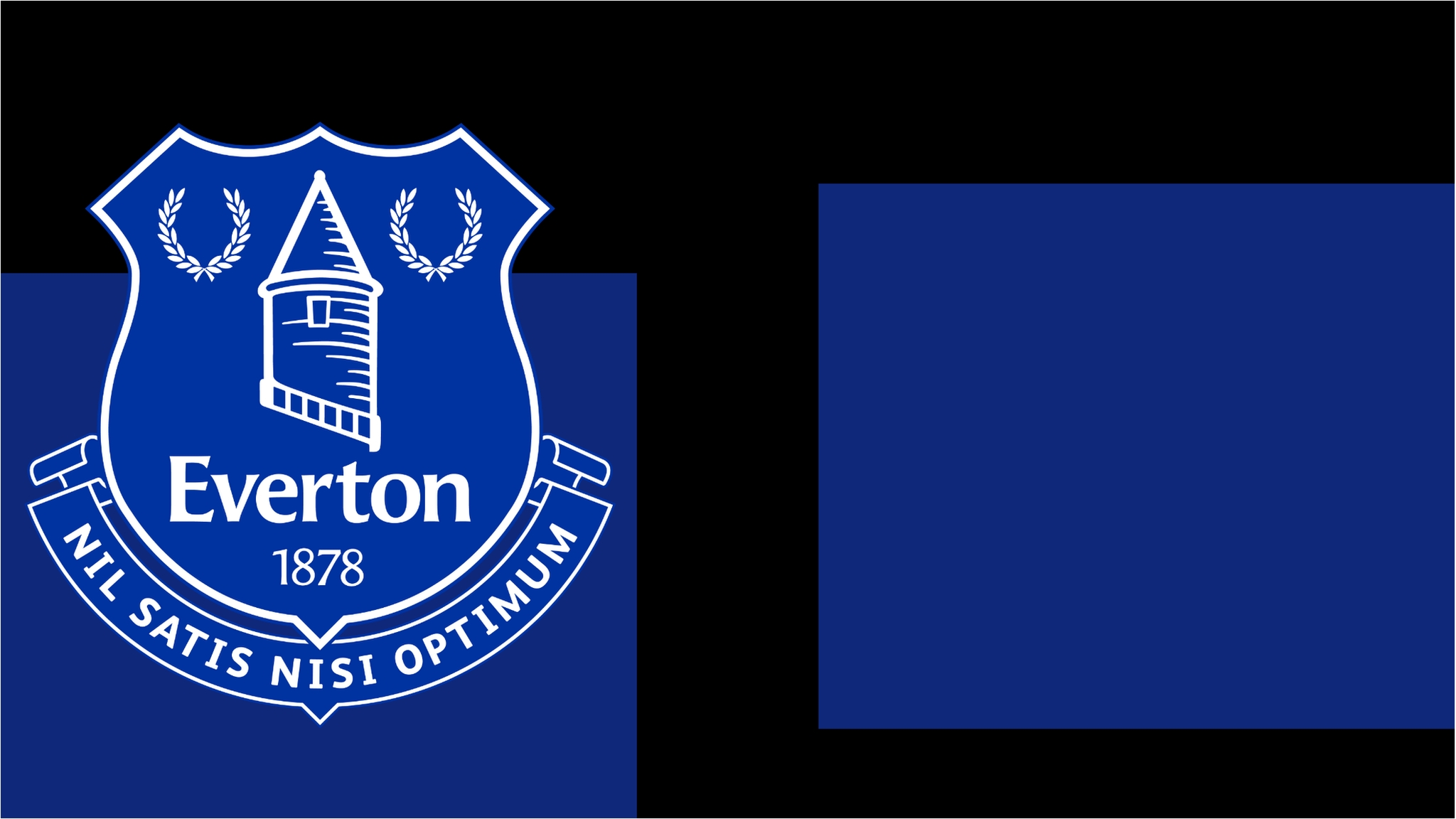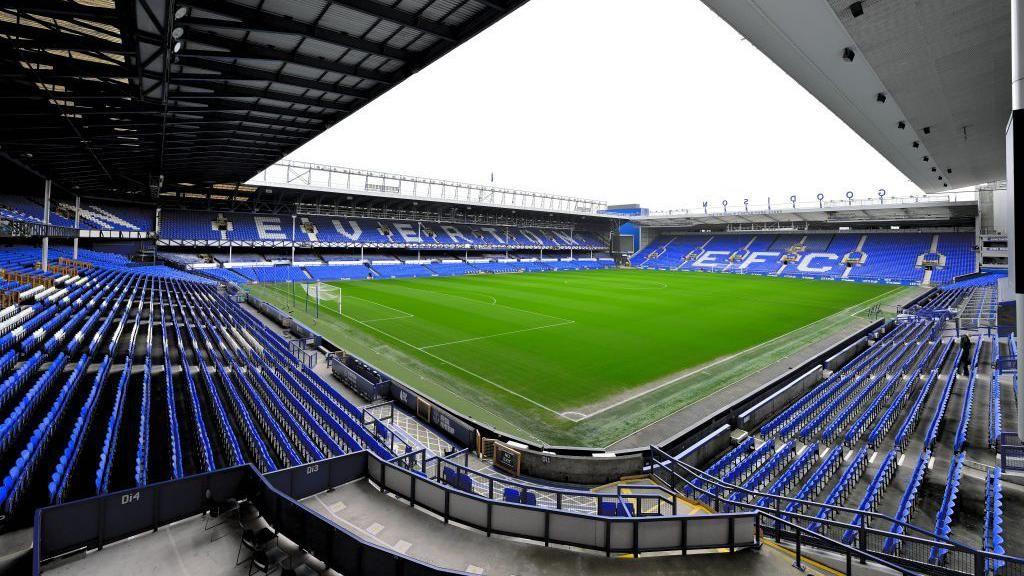How Everton became a club of 'chaos, crisis, dysfunction and mutiny'
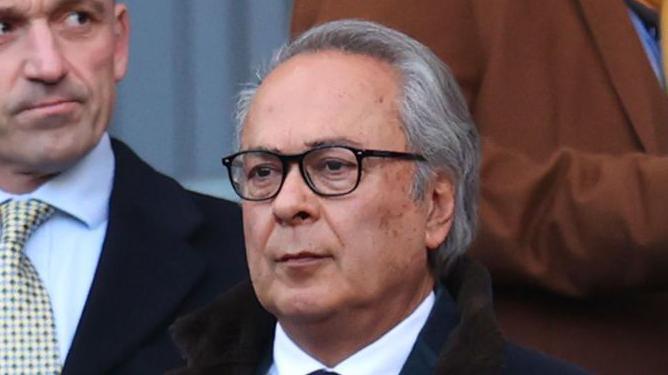
Farhad Moshiri bought a 49.6% share in Everton in 2016, increasing his stake to 94.1% six years later
- Published
When Farhad Moshiri laid out his grand plan for supremacy after taking control at Everton, the mission statement was that he did not want the club to become "a museum".
As Moshiri finally takes his leave after almost nine years of chaos, dysfunction, discontent and squandering of finances on an industrial scale, the great old stage of Goodison Park has more closely resembled a mausoleum.
Moshiri's imagined path to glory was paved with good intentions when, hailed as "the perfect partner" by then chairman Bill Kenwright, he bought a 49.6% share in Everton in February 2016.
Instead, very occasional shafts of light have been overshadowed by fan fury, managerial churn, relegation battles, boardroom collapse, Premier League points deductions and a financial crisis that pushed Everton to the brink.
In all, Moshiri invested around £750m in his dream but ended with little or no financial return as Everton spiralled downwards.
So, as American billionaire Dan Friedkin takes charge after purchasing Moshiri's now 94.1% stake, how will the British-Iranian businessman's time be recalled and what, if anything, will be his legacy?
Moshiri's managerial mayhem
Everton were regarded as a model of stability during the 11-year reign of David Moyes from 2002-13.
However, Moshiri replaced this serenity with a rapid-fire revolving door approach during which he made seven full-time appointments, the first six lasting an average of only 309 days each between their first and final games before current incumbent Sean Dyche.
Moshiri made his intentions clear and set the tone for his tenure quickly after buying into Everton, his purchase funded by selling his 15% share in Arsenal to business associate Alisher Usmanov for £200m.
Roberto Martinez, the manager Moshiri inherited, was sacked 72 days after his arrival. Ronald Koeman was then lured from Southampton by a deal that was worth a reported £6m a year.
Koeman was joined by Steve Walsh, regarded as one of the driving forces behind Leicester City's remarkable Premier League title triumph in 2016.
Walsh, Everton's first director of football, was portrayed as the man behind signings such as Riyad Mahrez and N'Golo Kante when he was assistant manager with the Foxes.
It was Walsh's first director of football role. It was Moshiri's first mistake.
This arranged sporting marriage of convenience never seemed a comfortable fit. Despite a united front, there were whispers behind the scenes about "Koeman signings" and "Walsh signings". Never a good sign.
Everton's transfer strategy certainly hinted at confusion.
Koeman guided Everton to Europe in his first season. But for a club that successfully existed on limited finances under Moyes, the problems really started when Moshiri began throwing his financial weight around in the summer of 2017.
Jordan Pickford has been a wonderful success since signing for £30m from Sunderland that summer, but elsewhere a scattergun strategy was desperately flawed - the failure to adequately replace striker Romelu Lukaku following his £90m move to Manchester United a decisive error.
It was exposed by Everton signing three players for the number 10 role at the same time. Wayne Rooney returned from Manchester United, Ajax captain Davy Klaassen was out of his depth after his £23.6m arrival, while Moshiri ended a transfer impasse with Swansea by paying a club record £45m for Gylfi Sigurdsson.
Koeman was out in October with Everton 18th and after a run of poor results under caretaker David Unsworth, Moshiri turned to Sam Allardyce, an unpopular appointment that raised the first serious questions about the owner's capabilities and judgement.
Allardyce guided Everton to eighth but was sacked at the end of the season after six months in a wholesale managerial revamp.
Moshiri next fulfilled a desire to appoint Marco Silva, who he had unsuccessfully targeted before Allardyce and had now been sacked by Watford with the club blaming Everton's initial ham-fisted approach for his and their decline.
Also arriving at Goodison Park was PSV Eindhoven's highly regarded director of football Marcel Brands to replace Walsh.
Brands created such a good early impression that Moshiri rewarded him with a place on Everton's board and "a broader remit, responsible for the whole footballing strategy at the club, rather than just player recruitment".
Once more, Moshiri's plans never came to pass.
Brands ended up frustrated and marginalised, not helped by his own mixed record in the markets, with buys such as Moise Kean and Jean-Philippe Gbamin, who cost more than £50m combined, failing to bear fruit.
When it came to selecting managers, strategy was driven by the volatile whims of Moshiri, not Brands.
For a time, the new partnership worked as Silva's Everton finished eighth in his only full season, playing attractive football along the way. It was another false dawn.
Silva was sacked in December 2019 after a 5-2 loss at Liverpool, the decision taken against the advice of Brands, who was an admirer and keen to give him more time.
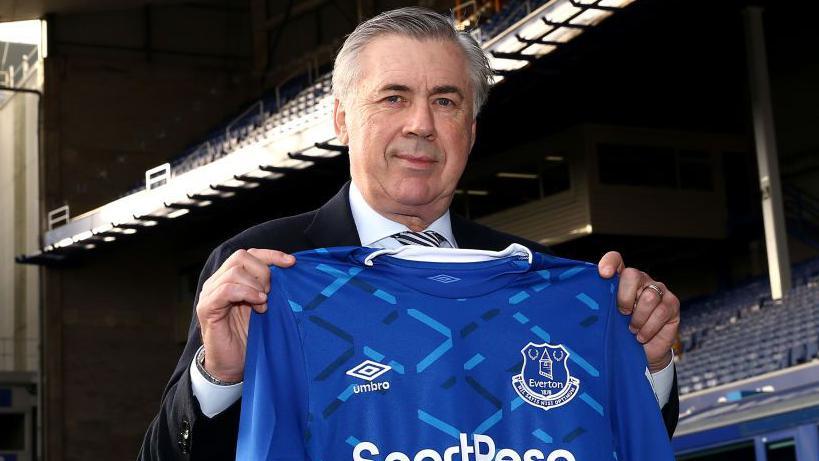
Moshiri's appointment of legendary Italian Carlo Ancelotti as Everton manager in December 2019 was his so-called 'Hollywood' appointment
Moshiri's impulsive nature was a regular catalyst for confusion, even rearing its head in the search for Silva's successor.
Chairman Kenwright had long wanted a reunion with Moyes. It looked like he would finally get his wish when Moyes travelled to Germany to meet Moshiri to finalise his reappointment.
West Ham United owner David Sullivan actually contacted Moyes while he was in Germany, asking him to return to the club for a second time but the Scot was - or so he thought - on his way back to Goodison Park.
Fate then took a hand.
On the night Moyes thought he was going back to Everton, Napoli sacked Carlo Ancelotti. Moshiri, impulsive as ever, saw this as his chance to finally land the stellar name he had always wanted.
Ancelotti accepted Everton's offer and the early signs were good. The Italian lured James Rodriguez to Goodison Park from Real Madrid, while the club even won at Liverpool for the first time in 22 years, but Ancelotti's only full season was mixed as they finished 10th.
When Ancelotti left to return to Real Madrid he had the highest win percentage from all Moshiri's appointments, a ratio of 46% from 67 games.
Moshiri then made his most controversial move - one that arguably sealed his fate with Everton fans - by appointing former Liverpool manager Rafael Benitez.
It was the most contentious managerial choice in Everton's history, with Benitez not only an Anfield icon after winning the Champions League in 2005 but also reviled by a large portion of the blue fanbase because of one infamous phrase, describing them as a "small club" after a derby draw in 2007.
Mike Richards, from The Unholy Trinity Everton podcast, believes this was when faith in Moshiri was lost.
He told BBC Sport: "When you go from 'Don' Carlo to the former Champions League manager of your bitter rivals, you have to question the sanity of those in charge of the club."
Everton's fans were in revolt before Benitez's arrival, although a threatening banner meant for the Spaniard emblazoned with the message "We Know Where You Live" lost most of its impact by being left outside the wrong house.
The influence of Brands, who did not drive the Benitez appointment, was vastly reduced. He left Everton in December 2021 shortly after an altercation with supporters after a 4-1 derby loss at home to Liverpool.
In reality, Benitez never stood a chance.
He lasted 154 days, short even by Moshiri standards, with Everton 15th in the table and increasing open mutiny among supporters.
Frank Lampard was the next cab off the rank, lasting less than a year but at least helping Everton avoid relegation in the penultimate game of the 2021-22 season as they came from 2-0 down to beat Crystal Palace at Goodison Park.
Sean Dyche was appointment number seven in January 2023, Everton having an even closer brush with relegation that season, surviving on the final day of the campaign with victory over Bournemouth.
Premier League survival, however, was only the tip of a very large iceberg Moshiri had steered Everton towards.
Four key areas for Everton's new owners to address
- Published19 December 2024
Boardroom chaos and financial meltdown
Moshiri's lavish spending was initially welcomed after the enforced thrift under Kenwright, but as time went on Everton's finances unravelled at an alarming rate.
Business associate Usmanov - who had failed to gain a power base at Arsenal - was an almost unspoken, controversial presence, sponsoring Everton's Finch Farm training ground, parts of Goodison Park, even securing an exclusive £30m option on naming rights for the new stadium at Bramley Moore Dock.
Moshiri was front of house but many suspected Usmanov was the power behind the throne - until Everton had to suspend all sponsorships with the Uzbekistani in March 2022, when his assets were frozen after Russia's invasion of Ukraine.
Events were closing in on Moshiri and Everton's board.
Long-serving chairman Kenwright, chief executive Denise Barrett-Baxendale, finance and strategy officer Grant Ingles, as well as playing legend Graeme Sharp, a non-executive director, said they had been told to stay away from the home game against Southampton in January 2023 because of "a real and credible threat to their safety".
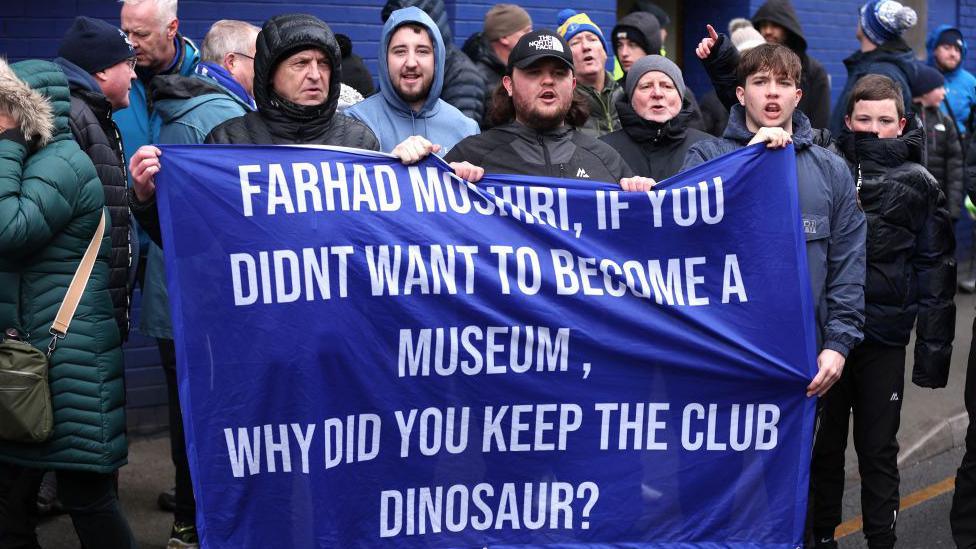
Everton fans protest against owner Moshiri and the club's board of directors at the game against Brentford at Goodison Park in March 2023
They never returned - fans further infuriated when Merseyside Police said no threats were reported by the club prior to the game.
It effectively sparked a civil war between fans and the board, Kenwright never again attending Goodison before his death, aged 78, in October 2023.
In the meantime, having posted losses of £430m over the past five years, Everton had also been referred to an independent commission by the Premier League for an alleged breach of profit and sustainability rules (PSR) in a three-year period to 2021-22.
Everton denied wrongdoing but were deducted 10 points, reduced to six on appeal. They were also docked a further two points for another breach by £16.6m for the three-year period to 2022-23.
Sales of Richarlison to Tottenham for £60m, Anthony Gordon to Newcastle for £40m and Amadou Onana's £50m move to Aston Villa last summer kept the club's head above water, and Dyche's steady management ensured Everton finished in the relative comfort of 15th place last season.
Even Moshiri's attempts to sell the club were a reflection of his questionable judgement, with US-based consortium 777 Partners initially agreeing a deal to buy his stake in September 2023. The group then became mired in legal and financial problems, eventually missing a June 2024 deadline to complete the takeover.
It left Moshiri and Everton back at square one, with Crystal Palace owner John Textor publicly declaring his interest before Friedkin, after initially walking away following a period of due diligence, returned to seal the deal supporters hope will finally end the years of misery.
Has Moshiri left a legacy?
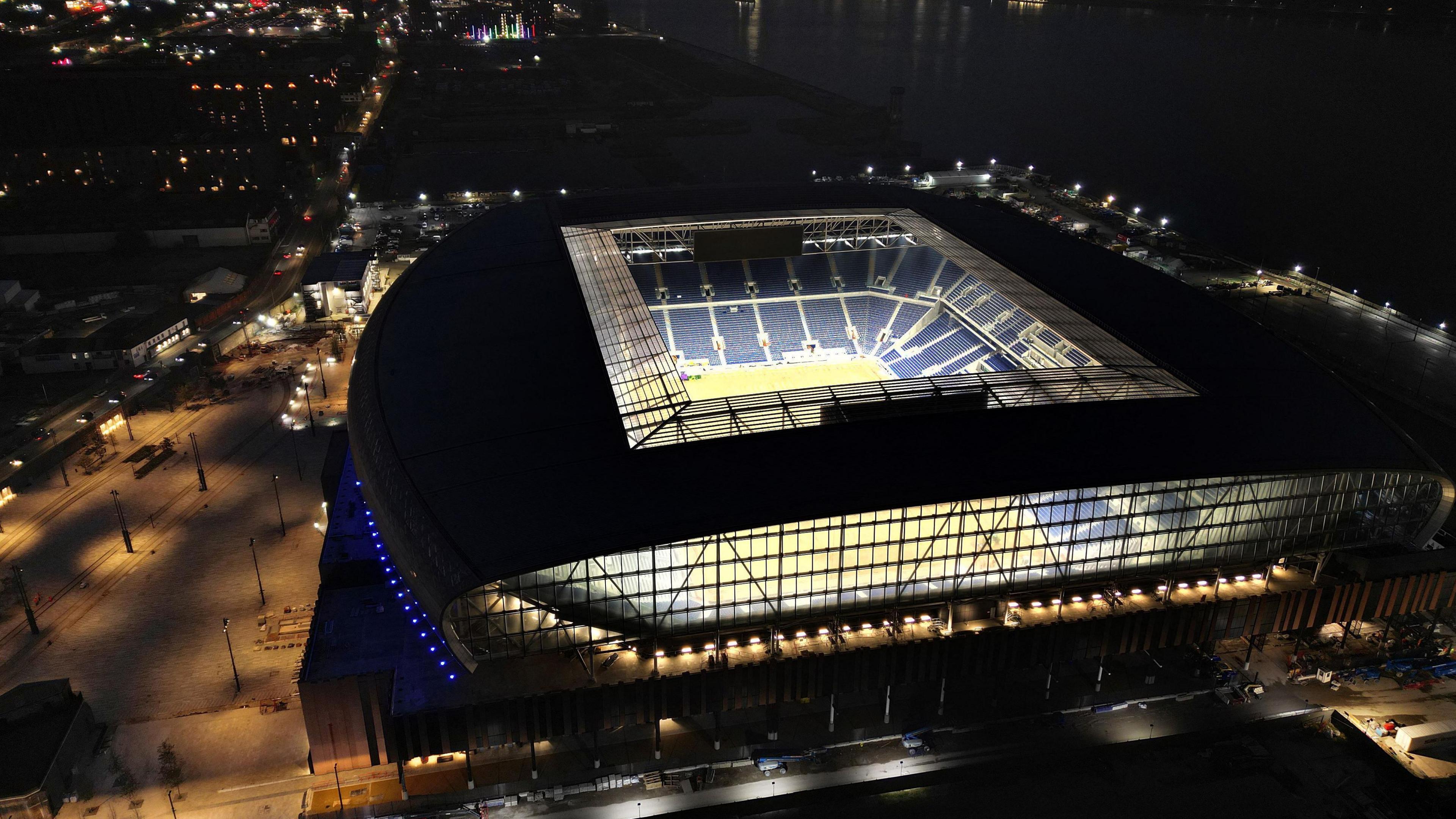
Everton's magnificent new stadium at Bramley Moore Dock has been built during Farhad Moshiri's time as owner
If Moshiri has a legacy, it will be the sight of a magnificent new stadium emerging on the banks of the Mersey and due to open for the start of next season. This new home has been promised more than once before, but it has been delivered during his ownership.
This does not mean, however, that the sheer havoc and disarray that Moshiri was a key figure in can be swept away.
"The new stadium has to be deemed a success. The location and design are simply incredible. It would have been much easier to walk away and locate on a much blander and unappealing site," said Richards.
"But while the new stadium can't be ignored, everything else can't be forgotten. As fans we've suffered for years. It's not dramatic to say it's almost brought many fans to their knees in sheer exasperation and fear at what might happen to our club.
"That is his legacy. Thanks Farhad - but close the door behind you."
Related topics
- Published26 July 2022
